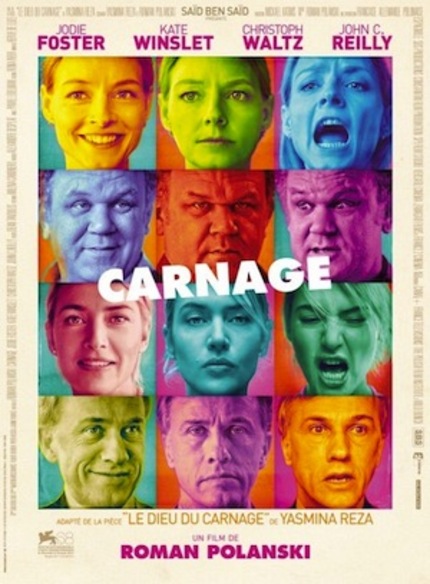London 2011: CARNAGE Review

Two couples are meeting after their sons have a fight in a local park. Penelope (Jodi Foster) and Michael (John C. Reilly) are the parents of the victim, and they have invited the parents of the perpetrator, Alan (Christoph Waltz) and Nancy (Kate Winslet) to their apartment to discuss and make amends. At first every one is being exceedingly polite, but the more they talk, the more the veneer of good manners is eroded and it becomes an all-out explosion of anger and emotion, about child-rearing, marriage and careers.
The success of live theatre relies mainly on two things: the constant transfer of energy between performers and audience, and the ability of the audience to see the stage at all times, thus constantly be aware of the actor's movements. A piece such as Carnage is built on that energy, which is never lost due to editing or change in setting. While Polanski manages to maintain the energy when all the characters are in one room, as soon as they move or the editing becomes too fast, the energy drops and the actors must find it and pick it up again (which they usually do, but it interrupts the flow.) Instead of being able to see all the characters at once, and engage with them and watch their body language, Polanski chooses to constant bombard the viewer with a series of extreme close-ups, which detracts from the dialogue. That may sound odd, but the words are designed to be projected, with the entire body language of the actor on display. To push all that through a close-up does not do an actor any favours, and makes it seemed forced.
That being said, it is the actors who save the film. Such characters and dialogue are a treat for any performer, and if nothing else, Polanski is very good at casting. Waltz and Reilly hold their own, though their parts are not nearly as fleshed out as the women's. Foster and Winslet steal the film; every nuance, every gesture from each of them displays the inner turmoil of their characters, and they are allowed much more license to spew forth (for those of you who see the film, pun intended) their anger and frustration, at their children, their lives, and mainly their husbands.
This is a great play: a comedy of manners that pits class against class, parent against parent, and husband again wife. Very much a piece of its time (that unfortunately might not age well,) it perfectly captures a certain brand of New Yorker at a certain time in New York. Unfortunately, it just doesn't transfer well enough to the screen. It might seem a little unfair of me to judge it on this basis, but its problems lie in the transfer. It was made for theatre, and hopefully you will get a chance to see it there.

Do you feel this content is inappropriate or infringes upon your rights? Click here to report it, or see our DMCA policy.





 (1)-thumb-80x80-93563.jpg)
